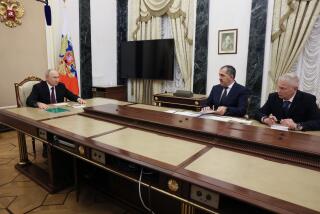Gorbachev Names a New Spymaster : Soviet Union: In a move to break up the KGB, he picks a top aide to direct foreign intelligence and establish it as a separate agency.
MOSCOW — In a move to break up the KGB as the Soviet Union’s once all-powerful intelligence and security force, President Mikhail S. Gorbachev on Monday appointed his chief foreign policy adviser to direct its foreign intelligence activities and place them under an independent state agency.
Yevgeny M. Primakov, 61, was named first deputy chairman of the State Security Committee, as the KGB is formally known, with a mandate from Gorbachev to plan the separation of intelligence-gathering from the agency’s security and counterespionage functions.
Primakov, a key Gorbachev adviser for the past five years, said he will immediately begin drawing up plans with Vadim V. Bakatin, the KGB chairman, for a separate intelligence service in compliance with the presidential decree.
Gorbachev’s new decree, characterized by a commentator on Russian Television as “perhaps the biggest reorganization” in the history of the KGB, is the latest in a series of moves to reorganize the agency after the involvement of its leaders in the conservative coup d’etat in August.
Bakatin pledged on taking over the organization--his predecessor is charged with treason for his part in the putsch--to restrict its activities to intelligence-gathering, analysis, counterespionage, investigation of serious crimes and protection of key installations.
The KGB would end its long role as the country’s secret police, pursuing the state’s ideological foes and critics, he said.
But the decision to separate its functions further reflects the misgivings that some critics, including Maj. Gen. Oleg D. Kalugin, the KGB’s former chief of counterespionage, still had about the concentration of power.
Although Gorbachev’s decree, as published, provided no details of the planned reorganization, political commentators here had written recently that the Soviet leadership was studying the division of responsibilities among the intelligence and security agencies of Britain, France, Germany and the United States in search of a model.
Primakov, the first outsider to head the KGB’s foreign intelligence service, told the Soviet news agency Tass after his appointment that he would emphasize the need for objectivity and professionalism in gathering and evaluating information from abroad.
“This is a very important service, whose purpose is to work not for a certain political structure, not for some personalities, but to defend state interests,” Primakov said. “The intelligence service must do everything possible to rule out a return to the Cold War. It must provide favorable conditions for the development of the economy and scientific and technical progress in the country. And it must be democratized and opened to the extent possible.”
“Judging by his behavior,” Tass observed, summing up its interview with the new intelligence chief, “Primakov is going to create a new image for this department.”
Primakov, a specialist on the Middle East and Gorbachev’s special envoy to the region during the Persian Gulf crisis, was described by Tass as “a man who clearly sees his tasks and who has a lot of information both from intelligence and on intelligence.”
“The leader of the intelligence service must be a political figure and lead the course directed at defending state interests independently from any corporate or group positions,” Primakov told Tass.
Primakov, a leading Soviet political scientist, added that some results of intelligence gathering and analysis could be published, arguing that it was as valid as a “science” as the work done by academics. He admitted, according to Tass, that he enjoys reading the espionage novels of John le Carre and political thrillers.
The urbane Primakov, a former journalist for the Communist Party newspaper Pravda, was director of the Institute of World Economy and International Relations, a leading Soviet think tank, when Gorbachev drew him into his circle of foreign policy advisers in 1985.
The weekly newspaper Argumenty i Fakty, which broke the story of Primakov’s appointment in its weekend edition, described him succinctly as “a rather mysterious but widely known person.”
Under Gorbachev, Primakov became chairman of one of the houses of the Supreme Soviet, the country’s legislature, a member of the party’s Politburo and a member of the Presidential Council and National Security Council. He has been a member of the prestigious Soviet Academy of Science for 10 years. During the conservative coup in August, he worked together with Bakatin to rally Communist Party and government officials to the president.
Primakov succeeds Lt. Gen. Leonid Shebarshin, whom he praised in the Tass interview.
More to Read
Sign up for Essential California
The most important California stories and recommendations in your inbox every morning.
You may occasionally receive promotional content from the Los Angeles Times.








